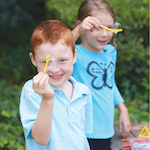
 It's summer at last - time to relax and take it easy. What does that mean for you and your family? It's not easy to slow down when there are so many demands on your time.
It's summer at last - time to relax and take it easy. What does that mean for you and your family? It's not easy to slow down when there are so many demands on your time.
How can you re-create for your children the feeling of the uninhibited play you might recall from your own childhood summers? Times have changed and demanding schedules are the norm - but you can still find that freedom in surprisingly small periods of time.
As parents, we can prepare hands-on projects that help children learn about the nature that surrounds them. It's important for them to experience how things grow and change. We so often only explain verbally - rather than showing them directly. Seeing is believing.
Start by consciously making room for free time - maybe one or two evenings a week with no commitments, plans, or video screens. Where are the moments when you don't feel pushed to accomplish something or get ready for the next item on the agenda?
With longer days and warm weather, the outdoors beckons. Family routines can change along with the season. The nightly reading time can be moved to the porch or patio, stars can be observed from a blanket on the grass, or dinner one night a week might be a picnic in the park or by the community pool. The whole family might enjoy walking the dog together right after dinner.
Adjust your routines so that you have time to just explore, notice, and observe. Can you slow down enough to take advantage of a few unscheduled pockets of time? For example, go outside when you have a break at work - sit on a bench and feel the warmth of the sun and notice what's there - the trees, traffic, birds, or the clouds. Find things you never saw before, and perhaps you'll return to your tasks refreshed, with a new orientation. Any time you stop at a traffic light, look around - and possibly make a new discovery.
For many children, camp takes the place of school throughout the summer. Most children thrive in traditional camps. They may not be a significant addition to a future resume, perhaps, but they do provide children with a chance to be outside, make new friends, sing camp songs, find animal tracks, learn to swim or canoe, and cook on a campfire. No matter the type of summer care you choose for your child, the goal is for children to feel free and have fun. They can benefit from any type of summer program - it needn't be academic or competitive. Summer is the perfect time to take a break from the required lessons, classes, and practices. Relaxing your child's routine can promote the natural discovery of new interests.
Did you know that real learning takes place when a child is free to explore? Not every moment needs to be a defined "learning opportunity." You might go to the museum and just follow along as your children wander. Take your blanket to the park. While you lie in the sun, the children can play and discover what the park has to offer.
It goes without saying that safety comes first. A toddler can play in a fenced-in playground or in your child-proofed yard. You will know when your children are ready for more independence. There's no need to script every moment, though you may be observing from a distance. The journey is what counts. Follow your toddler on a walk up the street, allowing for every distraction and many stops. Or sit down on the grass with your little one to watch the workmen digging with a backhoe.
Let go and relax this summer - enjoy the many moments that aren't scheduled. Without further justifications or suggestions, take advantage of those small pockets of time for laid-back fun. Give yourself a break from the usual routine. Enjoy your summer...it's all too brief.
"Live in the sunshine, swim the sea, drink the wild air."
—Ralph Waldo Emerson
—by Jane M. Jacobs, M.A., Montessori Educational Consultant at Montessori Services. She is a trained primary Montessori directress and also a Licensed Marriage and Family Therapist. She has taught children aged 2 to 7 years in Montessori schools, Headstart, and also in a preschool for children with developmental challenges. In her counseling practice, she helps individuals, couples, and families.
—Originally Published 2018